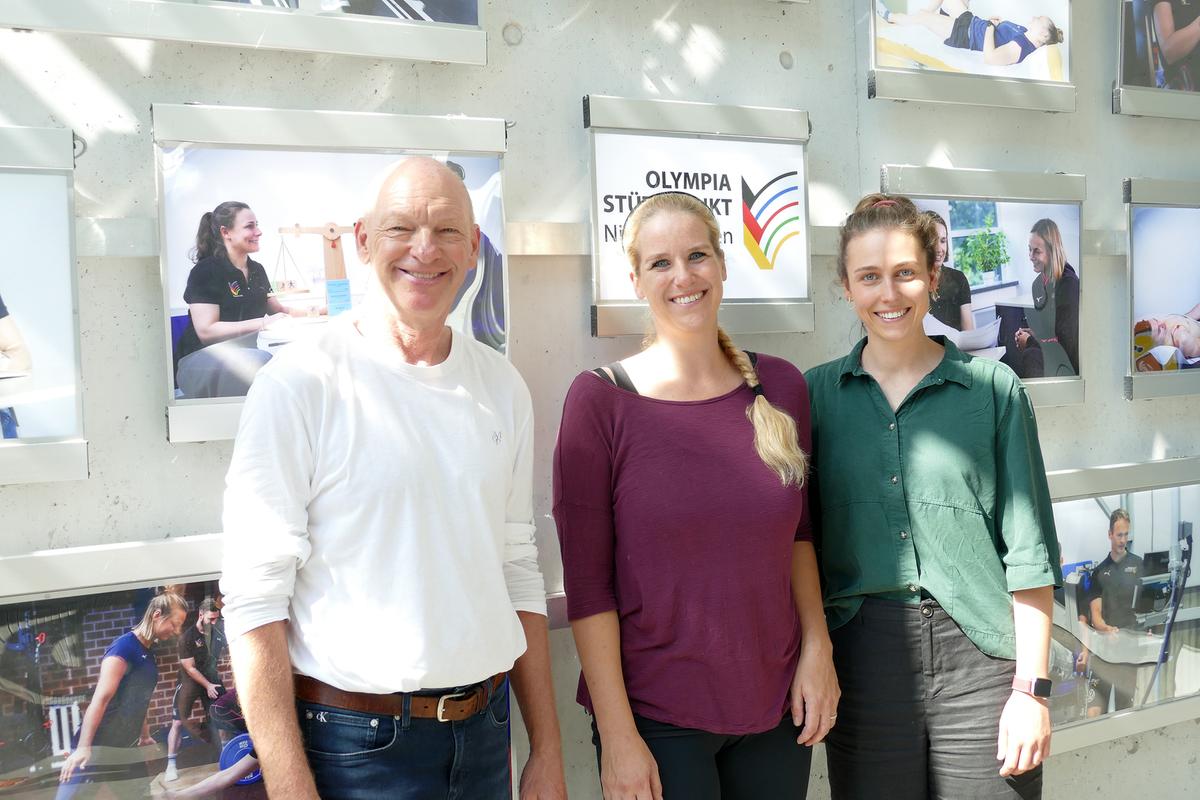MHH and Audi BKK launch tried-and-tested programme at secondary schools: KGS Pattensen makes a start.

Kick-off at the Lower Saxony Olympic Training Centre: Professor Uwe Tegtbur, headmistress Mirjam Gerull and sports scientist Ana Céline Braun (from left). Copyright Tina Götting / MHH
Children and young people should get at least 60 minutes of moderate to strenuous exercise every day. But the reality is different. The older girls and boys get, the less physically active they are. Only ten per cent of young people still meet the World Health Organisation (WHO) recommendation. This lack of physical activity increases the risk of serious illnesses at an early age. This is where the REBIRTH Active School exercise programme run by Hannover Medical School (MHH) and Audi BKK comes in. The programme is already running successfully at primary schools and is now being extended to secondary schools in an adapted form. The project partners brought the Ernst-Reuter-Schule KGS Pattensen on board for the start of the programme.
Indications of early cell ageing
Lack of physical activity and obesity are associated with an increased risk of cardiovascular diseases such as strokes and heart attacks as well as metabolic diseases such as diabetes mellitus. ‘Studies on overweight adolescents prove that fat deposits can already appear on the arterial walls at a young age,’ explains Professor Dr Uwe Tegtbur, Director of the Clinic for Rehabilitation and Sports Medicine and project manager of REBIRTH Active School. At the same time, the positive effects of regular physical activity on general health are well known.‘People who integrate sport into their daily routine have longer telomeres,’ says Professor Tegtbur. Telomeres are a marker of cellular ageing. They are located at the end of chromosomes and protect them from cancer, for example. The longer they are, the better. ‘According to a French study, telomere lengths are already 24 per cent shorter in overweight and inactive children and adolescents,’ explains Professor Tegtbur.
Excessive media use
The REBIRTH Active School team believes that excessive media use is one of the many reasons for the lack of exercise.More than 40 per cent of 11 to 17-year-olds spend more than three hours a day in front of the television or PC. Mirjam Gerull, Head of Ernst-Reuter-Schule KGS Pattensen, has also observed a connection between media consumption and lack of exercise: ‘Many young people prefer to spend their breaks on their smartphones rather than romping around with others or playing sports games. ’As KGS Pattensen is already successfully implementing innovative approaches in everyday school life, MHH and Audi BKK approached the school directly. When the school heard about the opportunity to take part in the REBIRTH Active School programme, it immediately agreed. ‘Health is the most important thing in life, and exercise increases the ability to learn,’ explains Mirjam Gerull. ‘As a school, it's our job to offer our pupils opportunities for exercise. ’The school sees itself as a movement-friendly school and has a very large sports department.
Start after the autumn holidays
After the autumn holidays, all seventh and one eighth grade class will get started. With playful three- to five-minute exercise sessions spread throughout the school day during lessons as well as additional sports activities, the youngsters will be given a boost. Gradually, all other classes at the school will be included in the exercise programme. The school management and teaching staff have been preparing the project since the summer holidays. In the last week of the holidays, more than 100 KGS teachers came together with the REBIRTH Active School team for a preparatory meeting at the Lower Saxony Olympic Training Centre in Hanover.
Movement in everyday school life pays off
The experience of successfully implemented projects at primary schools in Lower Saxony shows that stimulating physical activity in everyday school life is worthwhile. ‘The children's physical fitness improves,’ explains MHH sports scientist Ana Céline Braun. She is particularly pleased: ‘The programme is very well received by the girls and boys. They enjoy being active.’ The activities also lead to a better and more relaxed class atmosphere. The pupils benefit from this just as much as the teachers. REBIRTH Active School was launched as a pilot project at primary schools in 2016.
Physical activity increases learning ability
Since 2021, the approach has been tested by the MHH as part of a scientific study at more than 30 primary schools in Lower Saxony and funded by Audi BKK. The REBIRTH Active School team also has the health insurance company at its side when it comes to expanding the project to secondary schools. ‘Prevention is a core task of Audi BKK and exercise is particularly important in the school setting. Not only for physical development, but also for the cognitive development and social interaction of the pupils. Experience from the projects has confirmed that the ability to learn is directly linked to physical activity,' says Dirk Lauenstein, Chairman of Audi BKK. The physical activity programme is being further developed for young pupils in line with their age. ‘The focus will be on exercises for strength, endurance and coordination. Nutrition and media consumption will also be addressed,’ explains Ana Céline Braun.
Text: Tina Götting